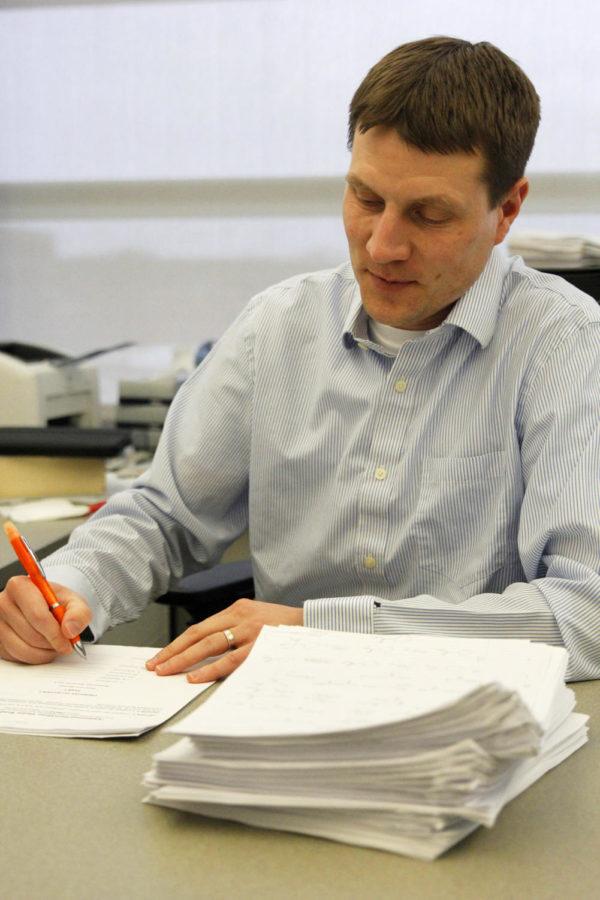ISU chemistry professor Levi Stanley wins award for catalysis research
Jonathan Krueger/Iowa State Dail
The National Science Foundation has announced Levi Stanley, assistant professor of chemistry, a recipient of its 2014 Career Award. The NSF Career Award is the Foundation’s most prestigious award in support of junior faculty.
March 14, 2014
The ISU chemistry department recently added another award to its trophy case.
Levi Stanley, assistant professor of chemistry, was awarded the National Science Foundation’s Career Award for his catalysis research. The award provided Stanley with $600,000 to continue research on catalysis.
The award, according to its description, is a “foundation-wide activity that offers the National Science Foundation’s most prestigious awards in support of junior faculty who exemplify the role of teacher-scholars through outstanding research, excellent education and the integration of education and research within the context of the mission of their organizations.”
Catalysis is the acceleration of chemical reactions by the action of a catalyst that remains unchanged at the end of the process.
“Winning an NSF Career Award means a number of different things to me and my research group,” Stanley said. “The award is a very nice honor for beginning faculty and provides financial support that will allow us to expand our research and outreach activities.
“Maybe more importantly, the NSF Career Award is validation that our research and education activities matter to the chemistry community and the broader scientific community. The NSF Career Award is a great springboard for a new research group to tackle more challenging research problems.”
William Jenks, professor and chairman of chemistry, shared his contentment with the work that Stanley has done.
“Obviously [winning the award] is a great thing for both Levi and the university,” Jenks said. “Only a small fraction of the faculty wins the award. [Levi] is easily among the great faculty here. He is very deserving of the award. We are very excited to have him here.”
Stanley said that his passion for science came as a kid learning from his mother.
“My mother is a middle school science teacher, so I had the opportunity to do experiments after school from an early age. Her passion for science and my early experiments as an elementary student were the genesis of my path to a career as a scientist,” Stanley said. “I knew I was on the right track when I watched my high school chemistry teacher run a thermite reaction in our classroom — not the safest experiment or wisest setting for the experiment, but very cool.”
As for goals for the rest of Stanley’s career, he said he is looking at the big picture.
“My biggest goal is for my research and teaching activities to have a positive impact on the way the scientific community thinks about solving problems, on the students who are involved in solving research problems and on the way society perceives chemistry and science in general,” he said.
Stanley also said that one of the biggest challenges he faces today is balancing his research with his teaching.
“As a young faculty member, you feel like you are pulled in many different directions. I continually remind myself that my research activities are really an extension of my teaching activities,” Stanley said. “My teaching activities should help to train the next generation of scientists — if we don’t have the next generation of scientists, then I won’t have students in my lab to solve research problems that will have an impact on society.”
Stanley started at Iowa State in the spring of 2012, and was quickly recognized for his work on catalysis. In August 2012, he was named the Carlyle G. Caldwell Endowed Chairperson, which provided him with two years of supplemental funds for catalysis research.

















